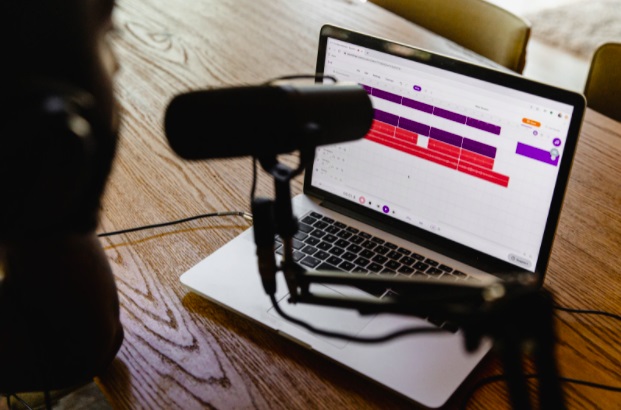Useful Tips To Make Your Voice-Over Recordings More professional
The best thing about it is that you don't need to be a sound engineer or record in a high-quality studio to create a professional recording, despite popular belief. All you need to do is find out all the ways you can create a decent recording environment, use the right equipment, the rest depends on your charisma and charm to deliver what you have to say. If you're looking to make your recordings more professional to reach more people, here are some tips to help you out.
 Picture 1 of Useful Tips To Make Your Voice-Over Recordings More professional
Picture 1 of Useful Tips To Make Your Voice-Over Recordings More professional
1. Consider Your Space
To make your voice-over recordings more professional, you need to find space with minimum background noises. Soundproofing is your best bet against all unwanted sounds from your surroundings, and it doesn't have to be too expensive. Room treatments could be a bit costly but definitely worth it. However, there are other cost-effective ways to soundproof. Avoid spots near windows and doors, and hang blankets, curtains, or install plastic door sweeps. You can also install insulation to floors and ceilings made of rubber, cork, or foam.
2. The Right Microphone In The Right Spot
To record professional voice-overs, the microphone is your main tool to achieve the best possible recording. When it comes to the choice of a microphone, first, research the different types of voice-acting microphones. Forget about fancy large diagram condenser mics and look for broadcast dynamic microphones. Another important aspect is where you choose to place the microphone you end up with. For a more present sound, place the microphone 8–12 inches in front of your mouth, but if that sounds muddy, pull it further back.
3. Invest In Proper Gear
Even though it's the main tool to sound professional, a microphone isn't the only gear you need to have for great voice-over recordings. Headphones are another essential piece of equipment you need to efficiently listen to played-back recordings and determine flaws. Another piece of equipment that contributes to a professional recording is preamps, which you need to make sure you give a present sound and a low signal-to-noise ratio. Consider also investing in pop-filters that combat plosive sounds, esses or pops, and sibilance.
4. Do Test Recordings
Once you have all your equipment in check, don't jump right into recording without taking them for a test drive. Test recording is beneficial to ensure all your equipment works properly and adjusting the audio levels to your preference. It's much more efficient than recording straight away and discovering defects after spending time and effort on it. Try to also record ten seconds of silence to check if you have ambient noises. Remember to listen to play-back recordings with headphones, not speakers.
5. Prepare A Script
You can't expect to sound professional in a voice-over recording if you decide to jump in and wing it. You'll end up with too many pauses, messed up words and sentences, and a bunch of 'um's. Take the time to write what you intend to say in your recording word for word, not only to remember everything but so as not to drift into other unrelated topics. It will also give you a chance to practice what you'll say before hitting the record button. Make sure your script flows smoothly and is easily read, print it out to add notes instead of reading from a screen.
6. Choose An Efficient Editing Software
No matter how much you ensure your recording is flawless, editing is still an essential step once you're done. There are bound to be a few things to fix like trimming the beginning and end or removing any mistakes. You should also ensure you remove long silences between sentences or strange noises. To make sure you don't ruin a good recording during editing, choose the right editing software with an easy interface and features like audio processing and noise reduction.
 Picture 2 of Useful Tips To Make Your Voice-Over Recordings More professional
Picture 2 of Useful Tips To Make Your Voice-Over Recordings More professional
These tips will surely get you a more professional sound in your voice-over recordings. Ensure that you research the different brands of equipment to make the right choice and get ones that will last you a long time. Pay special attention to the small details that will aid in making you sound professional, like keeping a glass of water nearby to prevent your mouth from getting dry and warming up your voice before recording. With a bit of hard work and patience, you'll eventually have yourself a recording that sounds like it was done in a professional studio.
You should read it
- Top 5 tips to fix microphone on iPhone not working
- How to rotate the screen with iOS 11 audio microphone
- Tips to increase sound quality when recording videos with smartphones
- How to prevent iPhone from automatically recording voice messages
- Steps to install microphone on Windows 10
- Good tips and tricks in Windows 7 (Part 2)
- Pocket some quality video recording tips on iPhone
- 8 tweaks to help you improve video recording quality
- 10 tips 'can't be lost' because it's too useful you may not know
- How to switch voice by Modulate
- Tips for using Android phones to replace Microphones for computers
- Useful computer tips and tricks everyone should know
May be interested

4 Tips to Make Your Long-Distance Relationship Work During the Pandemic

4 tips on iPhone that few people know

Expert Tips That Will Help An HR Department Improve Their Performance

5 amazing tips to bust brain power while studying!

Effective Ways You Can Use To Improve Efficiency and Productivity In The Office

Tips and Tricks on How to Boost Your Likes






 How to Improve the Sound Quality of Voice Recordings on iPhone
How to Improve the Sound Quality of Voice Recordings on iPhone How to create a copy of the audio file in Voice Memos on iPhone
How to create a copy of the audio file in Voice Memos on iPhone How to Record Voice on iPhone
How to Record Voice on iPhone How to automatically delete the recording file in Voice Memos on iPhone
How to automatically delete the recording file in Voice Memos on iPhone Facebook buys the user's voice, the price may surprise you
Facebook buys the user's voice, the price may surprise you Tips to change voice on Zoom to make online learning less boring
Tips to change voice on Zoom to make online learning less boring